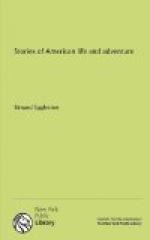Peter Petersen’s father was a Norwegian settler. When the news of the Indian attack came, Peter’s father hitched up his oxen, and put his wife and daughters and little Peter into the wagon. They drove the oxen hard, and got to Mankato in safety.
The town was crowded with frightened people. Many were living in woodsheds and barns. In their hurry, these country people had not brought food enough with them. Before long they began to suffer hunger.
Peter Petersen’s father thought of the potato field he had at home. If he could only go back to his house long enough to dig his potatoes, his family would have enough to eat.
When he made up his mind to go, Peter wanted to go along with him. As there were now soldiers within a mile of his farm, Peter’s father thought the Indians would not be so bold as to come there. So he and Peter went back to the little house.
The next morning Peter’s father went out to dig potatoes. Peter, who was but five years old, was asleep in his bed. He was awakened by the yells of Indians. He ran to the door just in time to see his father shot with an arrow.
Little Peter ran like a frightened rabbit to the nearest bushes. The Indians chased him and caught him. They were amused to see him run, and they thought he would be a funny little plaything to have. So they just set him up on the back of a cow, and drove the cow ahead of them. They laughed to see Peter trying to keep his seat on the cow’s back.
[Illustration.]
The little boy lived among the Indians for weeks. They did not give him anything to eat. When he came into their tents to get food, they would knock him down. But he would pick up something to eat at last, and then run away. When he could not get any food, he would go out among the cows the Indians had taken from the white people. Little as he was, he would manage to milk one of the cows. He had no other cup to catch the milk in but his mouth. Whenever any of the Indians threatened to kill him, he would run away and dodge about between the legs of the cows or among the horses, so as to get out of their way. Sometimes he was so much afraid that he slept out in the grass, in the dew or rain.
After some weeks, Peter and the other captives were retaken by the white soldiers sent to fight the Indians. But the poor little boy could speak no language but Norwegian. He could not tell whose child he was, nor where he came from. His mother and sisters had left the dangerous country near the Indians. They had gone to Winona, a hundred and fifty miles away. One of his sisters heard somebody read in the paper that such a little boy had been taken from the Indians. The kind-hearted doctor in whose house she lived tried to find the boy, but nobody could tell what had become of little Peter. His family at last gave up all hope of seeing him again.
When Peter was taken by the soldiers, he had worn out all his clothes in traveling through the prairie grass. He had nothing on him but part of a shirt. The soldiers took an old suit of uniform and made him some clothes. He was soon dressed from top to toe in army blue.




